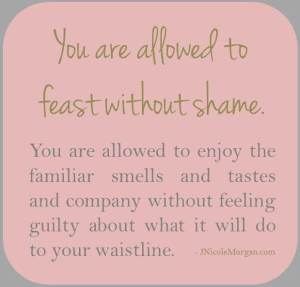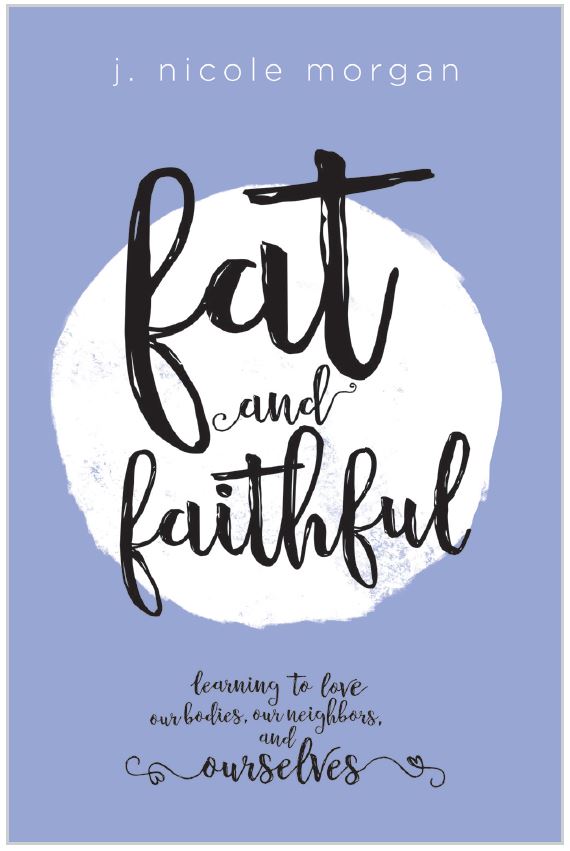A Feast Without Shame

[image: a satisfying dinner at the end of a long stretch of exhausting days]
Last night I came home from work and went immediately to the kitchen to start cooking dinner. It was the end of a seven day stretch of work days, three of them starting at 4 a.m. My sleep schedule was off, I was fighting off a scratchy throat that usually signals that I’m about to be knocked out for 24 hours, and my feet were killing me. I was craving some comfort food, and for me, that meant setting a pan of quinoa to boil and finally figuring out a way to use that grapefruit I’d had sitting on the counter. I scrounged around the cupboards and fridge and found some dried cranberries, walnuts, kale, a little bit of feta, and some broccoli and made myself a delicious salad with a grapefruit vinaigrette. It was a delicious meal full of layered flavor and just what I needed to feel calm and at rest after a crazy, exhausting week.
I’ve always loved cooking and food – but there were many years where I was ashamed to admit my love those things -thinking it would surely lead into a fat joke of the “of course she does!” variety.
If I am hungry and tired and want something that is going to give me energy and make me feel satiated – I will most likely crave something like my kale, quinoa, and grapefruit creation. But there are times when the sweet warmth of an apple crisp is what is desired. And sometimes the celebration of cake and ice cream with the smell of blown-out-candles wafting through the air is just what the occasion ordered.
Eating, and at times feasting, is part of our life. (For those of us privileged enough to have the food and resources and time to devote to feasting.) One of my favorite stories of feasting in the Bible is one that is completely counter-intuitive to our contemporary wisdom about food or “justice.”
In an article I wrote, I pointed out that “in the story of the Prodigal Son, the wayward son squanders his life on excessive living; he is a glutton. When he returns he is not met with strict rules of deprivation and a focus on what not to do; instead he is met with a feast. The father reminds him of the reasons to celebrate and rejoices with extravagant and abundant food.”
So much of the “devotional diet” advice is to restrict and limit and count. The overarching theme seems to be that we can’t be trusted with food. We talk of moderation, as if that’s the goal and the end and the way we know we are doing it right. There are of course ways to abuse food, to be wasteful, to eat in ways that show disregard for our fellow humans and the rest of creation. Moderation has it’s place – but sometimes, we feast.
And the Prodigal Son is not the only one who got to feast.
The ancient Israelite feasted regular – ordained holidays set aside to bring the best to the table for a time of celebration. We are continually told throughout scripture of a wedding feast. Jesus performed his first miracle at a feast – adding better wine to the celebration already going on.
There’s much to say about how our contemporary society has a problem with over-consumption, how we are on a downward spiral of always wanting more and better and new and bigger. There’s much to say about the differences in biblical feasts and the way we feast today. There’s a lot to say about that that is valid and true and important – but today, three weeks away from Thanksgiving in the United States and just a few more until Christmas – I want to remind you that feasting is good.
Feasting is God-ordained. Feasting has beauty and power and meaning and importance. Feasting is part of family and community and learning to love the people that share this planet with us.
 You are allowed to feast without shame. You are allowed to enjoy the familiar smells and tastes and company without feeling guilty about what it will do to your waistline. You are allowed to change the conversation as directly or subtly as you wish if a fellow diner insists on spoiling the festivities by mentioning scales or the gym in some judgmental, shame-inducing way. You are allowed to proclaim your love of the food and the togetherness no matter what size your waistband is.
You are allowed to feast without shame. You are allowed to enjoy the familiar smells and tastes and company without feeling guilty about what it will do to your waistline. You are allowed to change the conversation as directly or subtly as you wish if a fellow diner insists on spoiling the festivities by mentioning scales or the gym in some judgmental, shame-inducing way. You are allowed to proclaim your love of the food and the togetherness no matter what size your waistband is.

this is lovely, and so needed for me right now. Thank you.
LikeLike
Thank you for taking the time to let me know it encouraged you. I really appreciate that. 🙂
LikeLike
Wow this looks so delicious! ❤
LikeLike
it WAS delicious. 🙂
LikeLike
Today during our morning devotion, we looked at self love. Loving God, ourselves, others and all of creation. As I prayed I was reminded that food is a part of God’s creation, one which should also be loved. A healthy love of food, real food, is no doubt a godly thing. 🙂
LikeLike
amen.
LikeLiked by 1 person
Thanks for following! Its always great to meet like minded people on the blog sphere.
LikeLike
Of course. love food, uh – we’re human. That’s it, HUMAN, able to analyse, put the history of our species in a linear time frame.
What we ate 20 years ago – 100 years ago – 100,000 years ago.
Here’s a hint: We’ve become sterilized so much that the biology , the microbes that should be eating all that extra whatever — and contributing to “our” good “balanced” health is missing. (we get fat?)
Here’s a starting place to re-inhabit our bodies with the correct biology: It’s a country barn, it’s clean, but hey (hay dust) it’s a barn, fresh straw (wheat dust) the cows are in the pasture all day. They enter the barn, happy to get a treat of hammer-milled grain. As I remember it was oats (smells great) Barley, Milo, (milo’s other name is cafricorn) Corn. Maybe a little protein supplement sprinkled in. I dump a gallon in each cows spot ( dust)!!!
I mentioned it’s a barn with all the barn smells and I’m milking by hand – the streams of milk going into the bucket are blasting through the air and picking up molecules / atoms of everything in the air. Go figure?
Oh, and the milk and cream separate when chilled overnight, usually less than 3 inches of cream on a gallon jar – un-pastuerized – not homogenized, and in about 3 days anything left over makes the absolute best sour cream coffee cake, the most perfect pancakes.
But caution, this has risk.
LikeLike
Well written. I love your views. Just what I needed to read.
LikeLike
Pingback: Discovering my tastes | J. Nicole Morgan
Thank you
LikeLike